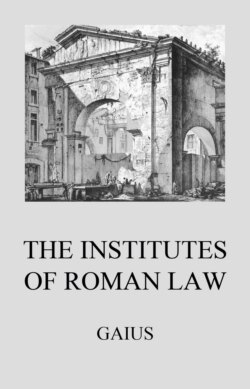Читать книгу Institutes of Roman Law - Gaius - Страница 16
На сайте Литреса книга снята с продажи.
ОглавлениеDE LEGE FVFIA CANINIA.
§ 42. Moreover, by the lex Fufia Caninia a certain limit is fixed to the number of slaves who can receive testamentary manumission.
§ 43. An owner who has more than two slaves and not more than ten is allowed to manumit as many as half that number; he who was more than ten and not more than thirty is allowed to manumit a third of that number; he who has more than thirty and not more than a hundred is allowed to manumit a fourth; lastly, he who has more than a hundred and not more than five hundred is allowed to manumit a fifth: and, however many a man possesses, he is never allowed to manumit more than this number, for the law prescribes that no one shall manumit more than a hundred. On the other hand, if a man has only one or only two, the law is not applicable, and the owner has unrestricted power of manumission.
§ 44. Nor does the statute apply to any but testamentary manumission, so that by the form of vindicta or inscription on the censor’s register, or by attestation of friends, a proprietor of slaves may manumit his whole household, provided that there is no other let or hindrance to impede their manumission.
§ 46. If a testator manumits in excess of the permitted number, and arranges their names in a circle, as no order of manumission can be discovered, none of them can obtain their freedom, as both the lex Fufia Caninia itself and certain subsequent decrees of the senate declare null and void all dispositions contrived for the purpose of eluding the statute.
§ 47. Finally, it is to be noted that the provision in the lex Aelia Sentia making manumissions in fraud of creditors inoperative, was extended to aliens by a decree of the senate passed on the proposition of the Emperor Hadrian; whereas the remaining dispositions of that statute are inapplicable to aliens.
§ 47. The lex Fufia Caninia, passed under Augustus (Sueton. Aug. 40), to prevent the degradation of citizenship by testators abusing their testamentary right of manumission, was generally called the lex Furia Caninia before the manuscript of Gaius was re-examined by Studemund; it was abrogated by Justinian. See Inst. 1, 7. The clause of the lex Aelia Sentia referred to in the text was retained by Justinian. Inst. 1, 6 pr.
